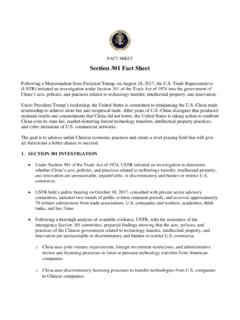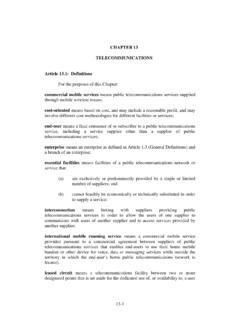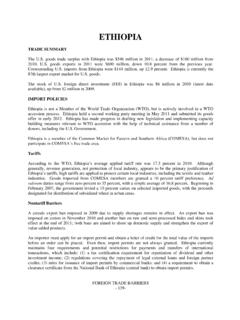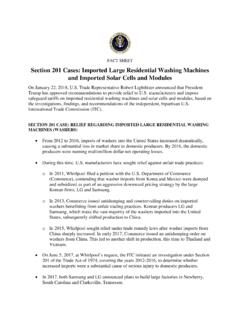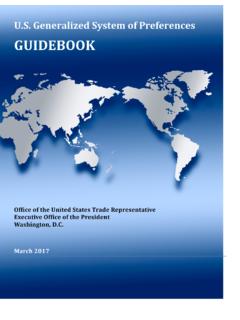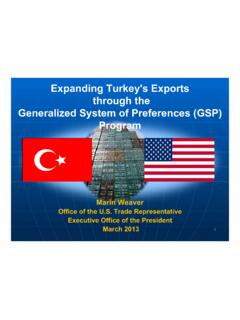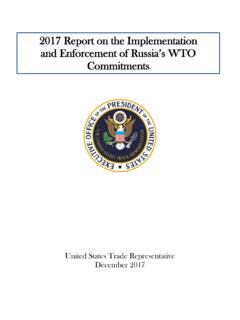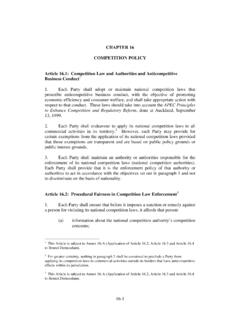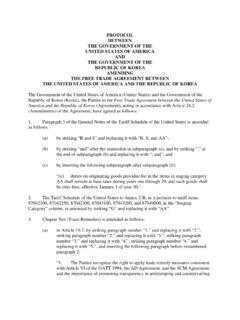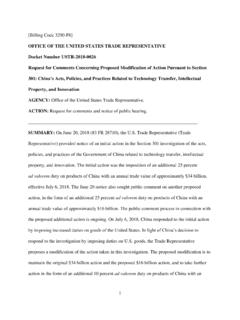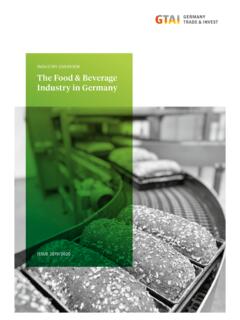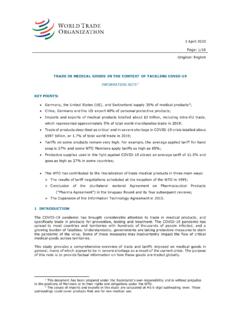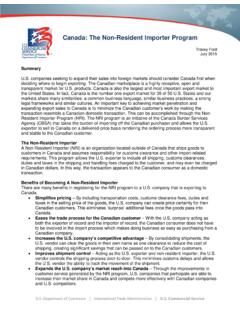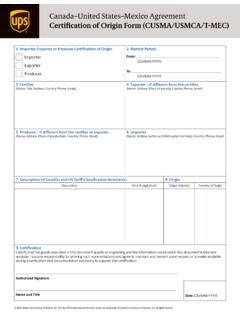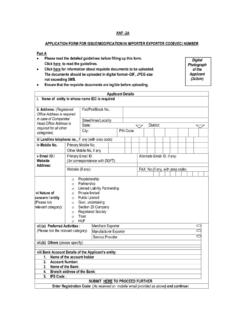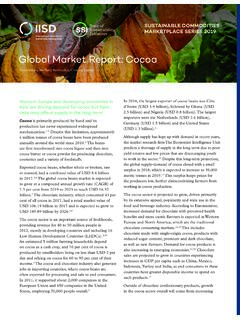Transcription of CHAPTER 5 ORIGIN PROCEDURES Article 5.1: Definitions ...
1 5-1 CHAPTER 5 ORIGIN PROCEDURES Article : Definitions For the purposes of this CHAPTER : exporter means an exporter located in the territory of a Party and an exporter required under this CHAPTER to maintain records in the territory of that Party regarding exportations of a good; identical goods means goods that are the same in all respects, including physical characteristics, quality, and reputation, irrespective of minor differences in appearance that are not relevant to a determination of ORIGIN of those goods under CHAPTER 4 (Rules of ORIGIN ) or CHAPTER 6 (Textile and Apparel Goods); importer means an importer located in the territory of a Party and an importer required under this CHAPTER to maintain records in the territory of that Party regarding importations of a good.
2 And value means value of a good or material for purposes of calculating customs duties or for purposes of applying CHAPTER 4 (Rules of ORIGIN ) or CHAPTER 6 (Textile and Apparel Goods). Article : Claims for Preferential Tariff Treatment 1. Each Party shall provide that an importer may make a claim for preferential tariff treatment, based on a certification of ORIGIN completed by the exporter , producer, or importer1 for the purpose of certifying that a good being exported from the territory of a Party into the territory of another Party qualifies as an originating good.
3 2. An importing Party may: (a) require that an importer who completes a certification of ORIGIN provide documents or other information to support the certification; (b) establish in its law conditions that an importer shall meet to complete a certification of ORIGIN ; 1 For Mexico, implementation of paragraph 1 with respect to a certification of ORIGIN by the importer shall be no later than three years and six months after the date of entry into force of this Agreement. 5-2 (c) if an importer fails to meet or no longer meets the conditions established under subparagraph (b), prohibit that importer from providing its own certification as the basis of a claim for preferential tariff treatment.
4 Or (d) if a claim for preferential tariff treatment is based on a certification of ORIGIN completed by an importer, prohibit that importer from: (i) issuing a certification, based on a certification of ORIGIN or a written representation completed by the exporter or producer, and (ii) making a subsequent claim for preferential tariff treatment for the same importation, based on a certification of ORIGIN completed by the exporter or producer. 3. Each Party shall provide that a certification of ORIGIN : (a) need not follow a prescribed format; (b) contains a set of minimum data elements as set out in Annex 5-A (Minimum Data Elements) that indicate that the good is both originating and meets the requirements of this CHAPTER ; (c) may be provided on an invoice or any other document; (d) describes the originating good in sufficient detail to enable its identification; and (e) meets the requirements as set out in the Uniform Regulations.
5 4. A Party shall not reject a claim for preferential tariff treatment for the sole reason that the invoice was issued in a non-Party. However, a certification of ORIGIN shall not be provided on an invoice or any other commercial document issued in a non-Party. 5. Each Party shall provide that the certification of ORIGIN for a good imported into its territory may be completed in English, French, or Spanish. If the certification of ORIGIN is not in a language of the importing Party, the importing Party may require an importer to submit, upon request, a translation into such a language.
6 6. Each Party shall allow a certification of ORIGIN to be completed and submitted electronically and shall accept the certification of ORIGIN with an electronic or digital signature. 5-3 Article : Basis of a Certification of ORIGIN 1. Each Party shall provide that if a producer certifies the ORIGIN of a good, the certification of ORIGIN is completed on the basis of the producer having information, including documents, that demonstrate that the good is originating. 2. Each Party shall provide that if the exporter is not the producer of the good, the certification of ORIGIN may be completed by the exporter of the good on the basis of: (a) having information, including documents, that demonstrate that the good is originating; or (b) reasonable reliance on the producer s written representation, such as in a certification of ORIGIN , that the good is originating.
7 3. Each Party shall provide that a certification of ORIGIN may be completed by the importer of the good on the basis of the importer having information, including documents, that demonstrate that the good is originating. 4. For greater certainty, nothing in paragraph 1 or 2 shall be construed to allow a Party to require an exporter or producer to complete a certification of ORIGIN or provide a certification of ORIGIN or a written representation to another person. 5. Each Party shall provide that a certification of ORIGIN may apply to: (a) a single shipment of a good into the territory of a Party; or (b) multiple shipments of identical goods within any period specified in the certification of ORIGIN , but not exceeding 12 months.
8 6. Each Party shall provide that a certification of ORIGIN for a good imported into its territory be accepted by its customs administration for four years after the date the certification of ORIGIN was completed. Article : Obligations Regarding Importations 1. Except as otherwise provided for in this CHAPTER , each Party shall provide that, for the purpose of claiming preferential tariff treatment, the importer shall: (a) make a statement forming part of the import documentation based on a valid certification of ORIGIN that the good qualifies as an originating good; 5-4 (b) have a valid certification of ORIGIN in its possession at the time the statement referred to in subparagraph (a) is made.
9 (c) provide, on the request of the importing Party s customs administration, a copy of the certification of ORIGIN , in accordance with its laws and regulations; (d) if a certification by the importer forms the basis for the claim, demonstrate, on request of the importing Party, that the good is originating under Article (Basis of a Certification of ORIGIN ); and (e) if the claim for preferential tariff treatment is based on a certification of ORIGIN completed by a producer that is not the exporter of the good, demonstrate, on the request of the importing Party, that the good certified as originating did not undergo further production or any other operation other than unloading, reloading, or any other operation necessary to preserve it in good condition or to transport the good into the territory of the importing Party.
10 2. Each Party shall provide that, if the importer has reason to believe that the certification of ORIGIN is based on incorrect information that could affect the accuracy or validity of the certification of ORIGIN , the importer shall promptly correct the importation document and pay any duties owing. The importer shall not be subject to penalties for making an incorrect statement that formed part of the import documentation, if it promptly corrects the importation document and pays any duties owing. 3. A Party may require an importer to demonstrate that a good for which the importer claims preferential tariff treatment was shipped in accordance with Article (Transit and Transshipment) by providing: (a) transportation documents, including the multimodal or combined transportation documents, such as bills of lading or waybills, indicating the shipping route and all points of shipment and transhipment prior to the importation of the good.
